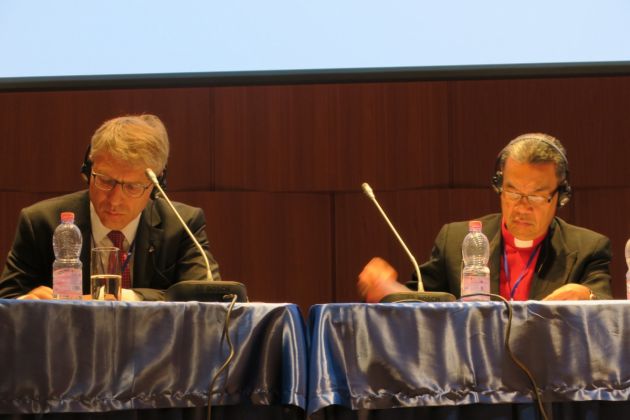For 3 European alliances, Evangelical-Catholic unity is going too far; WEA says it has not changed

For some European alliances, Evangelical-Catholic unity is going too far, getting too ecumenical for them.
Last month, the national evangelical alliances of Italy, Spain, and Malta - all members of the World Evangelical Alliance - wrote an eight-page open letter, Christianity Today reported Jan. 30.
In the letter they charged their parent organization with "moving away from its historic position" of holding the line against Catholic and liberal Protestant theology.
"In recent years we have sensed that the leadership of WEA has moved away from the outlined historic position of the Alliance on unity by endorsing a more 'ecumenical' attitude," the three alliances stated in December, in the year that the 500th anniversary of the Reformation was commemorated.
On October 31, Radio Vatican had noted the date marked the 500th anniversary of the day on which German theologian Martin Luther published his 95 theses, "setting in motion the events of the Protestant Reformation."
To mark the occasion, the Vatican's Pontifical Council for Promoting Christian Unity and the Lutheran World Federation issued a joint statement, "giving thanks for the spiritual and theological gifts received through the Reformation and recalling the commemorative events that have taken place over the past year."
But the LWF is not part of the WEA alliance, and its member churches are often viewed as traditional or "mainline" Protestants.
'UNITY A BLURRED TERM'
The Italian, Spanish and Maltese evangelicals wrote in their open letter, "Unity has become a blurred term to refer to any relationship even beyond the principles that have always characterized evangelicals.
"Leaders have become less cautious in talking about unity with the Catholic Church as such and have tended to bypass the historic boundaries."
Christianity Today said in its report that "during last year's 500th anniversary of the Reformation, many groups examined or asked: Is it over?"
The paper noted, "The loudest "no" has come from the conservative Protestants closest to Rome."
The growing closeness of the WEA and the Catholic Church - emphasized by a joint Reformation commemoration in 2016 that Thomas Shirrmacher, chair of the European Evangelical Alliance's theological commission, called a sort of "peace treaty" between Catholics and Lutherans - has caused "growing concern," the Spanish alliance stated.
"It seems, therefore, that WEA is about to sign a statement with the WCC (World Council of Churches) and the Roman Catholic Church on unity, even on 'great oneness'!" the December letter from the three European alliances stated. "We are puzzled by what is happening. We see a radical shift taking place."
"We therefore plead with you to stop the process," the alliances wrote. "Doing so will cause immense damage in the evangelical constituency worldwide."
The WEA responded to the charges of the three European member bodies that it has an "ecumenical agenda" inconsistent with its historic evangelical roots in a statement it posted on its website.
The statement placed on the WEA's website followed meetings between its secretary general Bishop Efraim Tendero and the alliances of Italy and Spain, Christian Today reported.
WEA says: "Although we have not resolved our disagreements, we have achieved greater understanding through this interaction."
'WEA HAS WORKED CLOSELY WITH POPE FRANCIS'
It says, "The WEA has worked closely with Pope Francis and the Vatican on many issues, such as responses to the worldwide persecution of Christians.
"We do not believe that we have changed, betrayed, or compromised the WEA's theological principles in doing so. However, we acknowledge the deep concerns expressed by these and other evangelicals from Catholic-majority countries."
WEA says, "We recognize that evangelical-Catholic relations are a highly sensitive issue for evangelicals in many parts of the world, especially those with majority Catholic populations.
"We know that our evangelical brothers and sisters in Italy, Spain, Malta, and elsewhere have had difficult and at times painful experiences in their interactions with the RCC. These realities are not overlooked in our ongoing discussions with the Vatican."
Christian Today said in its Jan. 17 story, "Conservative evangelicals have long been suspicious of anything that looks like too-close engagement with the WCC (World CCouncil of Churches) and the Roman Catholic Church by the WEA and mainstream Protestants.
"A new evangelical grouping, Covenant Christian Coalition, is seeking to position itself as a conservative alternative umbrella group for evangelicals globally."
